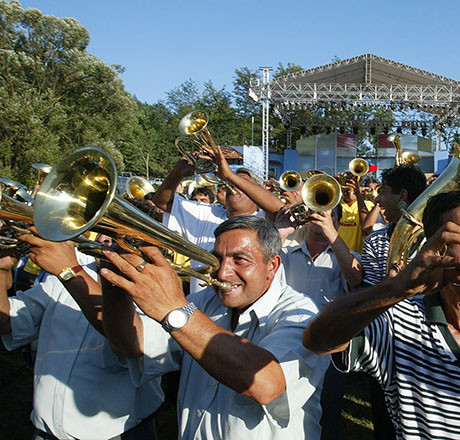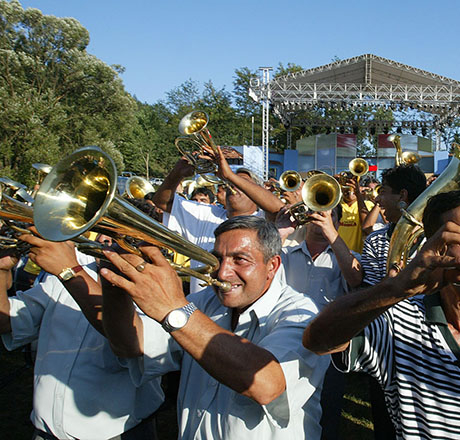Serbia
Serbia
The Hitchhiker’s Guide to Insanity
I was hurtling past Nis, Serbia, at 130 kilometres per hour in my Bulgarian Citroen, when the fluoro flash of pink caught my eye. I slammed on the brakes and pulled off the road about a hundred metres past her. A honk of the horn and she had turned to make that brilliant, mad dash, the sprint all hitchers dream about during those lonely roadside hours.
“It’s my policy to pick up hitchhikers,” I’d said to my road-trip companion, Iks, about half an hour earlier, in a tone that must have reeked of faux-hippie smugness. “It builds up karma.” I was also looking forward to the element of surprise a hitchhiker invariably adds to the journey.
After hitcher, suitcase and guitar had all been bundled into the car, we began pleasantries. She was a 40-something woman from Germany, of Turkish descent, called Gamze. At least that was her birth name. Her ‘God name’ was something completely different. Warning bells rang.
The next few exchanges yielded this information: she thought she’d left Germany on Saturday 17 December (today was Friday the 18th), she couldn’t remember where she’d been since then, and she had no money. Gamze could also, she told us, predict the future. She was selling possessions from her pink bag to make some cash on the road.
Then came the doozy: God had recently come to Gamze in a vision and told her to “go to Israel to save the children”. So, true to the divine command, she’d packed up all her stuff and hit the road.
This had very quickly turned into a scene from a comedy movie. Trying to keep a straight face and avoiding Gamze’s eyes in the rear-view mirror, I politely pointed out that an overland trip to Israel would require crossing Syria, which didn’t seem like a great idea. Gamze’s bulletproof response, delivered with a beguiling half-smile that suggested she might be taking the piss, was that God had given her this mission, therefore he would protect her. You can’t argue with that.
Iks and I found ourselves in an awkward position. Gamze was clearly delusional, possibly unstable. But we had already agreed to drive her past her destination to Sofia, and we could hardly leave a vulnerable woman in the middle of nowhere. So we continued.
Despite the elephant in the back seat, conversation with Gamze proved delightfully quirky. To paraphrase one of Terry Pratchett’s most excellent analogies, she had passed through insanity and into the calm waters on the other side. During the journey we discussed life, family, travel and music, with only the occasional mad interjection, at which even Gamze began to chuckle.
We were only half an hour from Sofia when things got dark. Gamze seemed to smell something in the air, which she took as an attempt by us to poison her. She became agitated and, despite our apologies, told us that we would have to “live with the consequences” of what we’d done. That sounded ominous.
I told Gamze that if it would make her more comfortable, we could leave her at the next town, but she curtly told us she’d still like to go to Sofia. We drove on in awkward silence. When we reached the city centre, she told us to pull over and, with barely a word of farewell, disappeared into the night.
The next day I met up with two Bulgarian friends at a cafe. As I regaled them with the tale of Gamze, one of them, Liya, became increasingly concerned, pointing out that the poor woman was probably schizophrenic and in need of help. She was right. She offered to call the police to file a missing persons report and, overwhelmed with waves of guilt for not having acted sooner, I agreed.
The phone call was going OK until she mentioned Syria. Then all hell broke loose. Within 10 minutes, four security police had barged into the cafe asking for ‘the Australian’. Clearly they’d misunderstood most of the story, assuming we were reporting a potential terrorist. They barked intense questions at me in broken English, before ‘escorting’ us to the police station.
As the cop car whisked us away with Hollywood urgency, I had a sinking feeling I was about to be accused of smuggling a terrorist into Bulgaria, when in fact my only crime had been to give a lift to a shivering woman on the side of the road, then trying to ensure she was OK. Two rights make a wrong, it seems.
Now, I’m not one to complain about being apprehended by foreign police when I can sense a good story in the making, but in a few hours I was due to catch a bus to Istanbul, where my Christmas flight to Melbourne awaited me. Spending the festive season in a Bulgarian prison did not seem like an attractive alternative.
I was in full panic mode by the time we got to the station, but thankfully my calm translator, Liya, set the record straight. She explained the situation clearly enough that even a policeman could understand it – no mean feat. After several hours of slow discussion, and a few pieces of cold pizza, the report was filed and I was free to go!
The lesson here? I’ll continue to pick up hitchhikers, and hitchhike myself, because of the amazing experiences it can provide. Never again, though, will I mention Syria to police who don’t speak my language.
Words Nick Johns-Wickberg
 (
(




